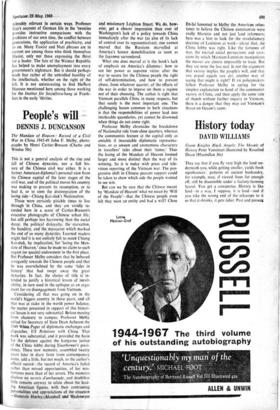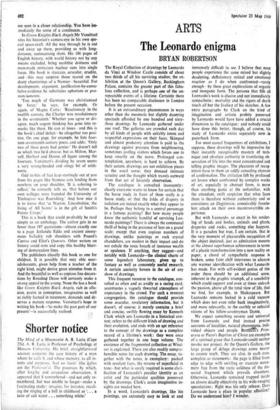History today
DAVID WILLIAMS
They say that if you fly very high the land un- derneath you, while getting smaller, yields fresh significances: patterns of ancient husbandry, for example, may, if viewed from far enough off, still be discernible under a factory-farming layout. You get a conspectus. History is like land—in a way, I suppose, it is land—and if you take the wrong end of the telescope to it so that it shrinks, it gets tidier. Past and present are seen in a closer relationship. You have ini- mediately the sense of a continuum. In Green Knights Black Angels Mr Vansittart sites his historian's camera-eye in his-own spe- cial space-craft. All the way through be is out and away up there, providing us with long- distance, summarising shots. His 186 pages of English history, with world history not by any means excluded, bring neolithic dolmens and man-made miniature nuclear suns into single focus. His book is staccato, oracular, erudite, and—this may surprise those reared on the dusty chunterings of a Namier—beautiful. For development, argument, justification-by-cumu- lative-evidence he substitutes aphorism or pro- nunciamento.
'Too much of Germany was christianised by force,' he says, for example. Or again, of Magna Carta : 'Reactionary in the twelfth century, the Charter was revolutionary in the seventeenth.' Whether you agree or dis- agree, much cogent thinking has gone into re- marks like these. He can at times—and this is the book's chief defect—be altogether too posi- tive. On one page, for example, he lists four- teen seventeenth century poets, and adds: 'Only two of these poets had genius.' He doesn't tell us which two he'd choose, but as Milton, Mar- vell, Herbert and Donne all figure among the fourteen, Vansittart's dividing by seven seems a very wrong-headed and stingy bit of arith- metic.
Odd tit-bits of fact leap startingly out at you from his pages like Siamese cats landing from nowhere on your shOulder, 'It is sobering to reflect,' he correctly tells us, 'that before our own colleges were founded the University of Timbuctoo was flourishing.' And how nice it is to know that 'at Nacton, Lincolnshire, the living of All Saints' is in the gift of Smith's Potato Crisps.'
This is a book that could profitably be read simply as an anthology. The author gets in no fewer than 187 quotations—almost exactly one to a page. Icelandic Edda and ancient anony- mous balladry rub shoulders with Pound's Cantos and Eliot's Quartets. Other writers on history could note and copy this healthy blurr- ing of demarcation lines.
The publishers classify this book as one for children. It is possible that very able near- adolescents, given help from a teacher of the right kind, might derive great stimulus from it. And the beautiful as well as copious line decora- tions by Rosalind Dease will certainly make a strong appeal to the young. None the less a book like Green Knights Black Angels, rich in allu- sion, poetic in conception, imaginative as well as richly factual in treatment, demands and de- serves a mature response. Vansittart's hope in writing his book—'to make the past part of our present'—is successfully realised.







































 Previous page
Previous page